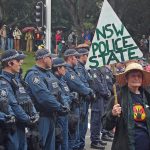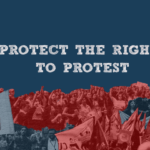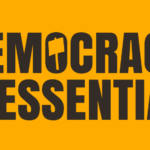Enshrine Protest in Law as Our Future Depends on It: Shoebridge on Protecting the Right

Human Rights Watch began the year with the release of its World Report 2023, in which it critiqued the disproportionate punishment the NSW anti-protest regime, which was established last April, results in for those who partake in demonstrating “without permission”.
Indeed, 2022 ended with the first major casualty of the draconian custodial and financial penalties that apply, as climate defender Violet Coco copped a 15 month prison sentence for blocking just one lane of the Sydney Harbour Bridge for 25 minutes.
The shock of this overly punitive response reverberated around the planet with the UN Special Rapporteur on Freedom of Association and Peaceful Assembly, Clement Voule, having tweeted that he was alarmed by the prison term and the fact that Coco had originally been refused bail.
And HRW further outlined that 2022 saw other Australian states following suit in passing laws to diminish the ability of civil society to make dissenting opinions on climate known via protest, as both Tasmania and Victoria upped carceral and monetary penalties that apply to such acts.
Protect the right
With the attacks against protest being launched at the state level, Australian Greens Senator David Shoebridge announced right before Christmas that he’ll be delivering a bill this year that enshrines the right to protest in federal law, which will serve to halt the erosion of the basic freedom.
According to the Greens justice spokesperson, the legislative acts of state governments against the ability to protest over 2022, amount to politicians weaponising “their power to criminalise descent stemming from their own decisions”.
NSW has placed a maximum of 2 years imprisonment on blocking roads, bridges, tunnels and major facilities, while in Victoria, it’s 12 months prison for obstructing logging, and in Tasmania, shutting off a workplace carries 12 months and its 2 years for attempting to save old growth forest.
And with First Nations Invasion Day protests set to take place across the country this week, Shoebridge further notes that these types of discretionary policing powers have a tendency to be applied to Indigenous communities more so than any others.
Protecting the future
The move to enshrine the right to protest in federal law, so that state and territory authorities can no longer encroach upon it, comes at a pivotal moment as government authorities are cracking down on those raising awareness about the mounting climate and environmental crises.
As the Greens senator behind the move underscores, whilst young people standing up to protect the earth from the ongoing assaults of industry, those corporations causing the destruction of the planet and future generations are, rather than being sanctioned, receiving greater protections to do so.
Sydney Criminal Lawyers spoke to Senator David Shoebridge about why federal protections are necessitated, the impact these laws will have upon First Nations communities and the deteriorating rights record this nation has on the international stage.
Firstly, on 20 December, you were in Tasmania at the Bob Brown Foundation, with fellow Greens Senator Nick McKim, to launch the protect the right to protest campaign.
David, laws pertaining to protests are usually the domain of the state and territories, so why should we be looking to protect them at the federal level right now?
We’ve seen repeated attacks on the right to peaceful assembly and the right to protest in states right across the country.
The international obligation to protect the right to protest – to protect civil and political rights – actually lies with the Commonwealth, who is the signatory of our international treaty obligations.
Given that the Commonwealth has the obligation to uphold the treaties, in particular the International Covenant on Civil and Political Rights, it’s only right and proper that the Commonwealth government step up and put in laws that effectively enshrine the right to protest in Australia.
In terms of the NSW laws, it’s been argued that authorised rallies are still permitted and it’s only unauthorised protests that are causing inconvenience to the public that are captured under the new regime and that’s how it should be.
So, why is it important that these sorts of unauthorised actions that may delay traffic and inconvenience the public don’t result in people serving long prison sentences?
Authoritarian regimes love the concept of an authorised rally. You can have an authorised rally in Singapore. You can have an authorised rally in Russia. And you can have an authorised rally in NSW as well.
The ability to gather must not be dependent upon a greenlight from the police.
That is the core civil right – the right to come together without requiring the permission or authorisation of the police – that has been taken away in NSW.
The various anti-protest laws that were rolled out last year in NSW, Victoria and Tasmania reveal that the authorities are trying to silence the voices of those defending climate and the environment.
So, are the anti-protest laws that governments, backed by industry, are enacting to try to stop efforts to draw attention to profitable activities that are detrimental to the planet the likely and to be expected scenario?
There are two potential options that government can take to the crisis in fairness in climate and in the environment.
The first is to address the substantive issues: to greatly reduce our carbon footprint, to protect the environment and to deliver fair economic policies.
The second is to aggressively police and clamp down on citizens who are protesting on those issues.
Tragically, the primary response we are seeing from states across the country is to police the protest rather than address the fundamental underlying cause, that is a policy setting that’s going to end in social and environmental destruction.
This is a policy setting the Commonwealth has an obligation to reset.
Human Rights Watch has just released a report condemning this country’s rights record on a number of points, including the crackdown on protests.
The UN special rapporteur on freedom of association condemned the 15 month sentence Violet Coco received for protesting.
Should we be concerned about the nation’s international reputation in this regard?
The international response should make us pause and reflect upon what’s going wrong domestically.
The fact that Australia is being singled out by international human rights groups as having an increasingly authoritarian approach to protest should be a wakeup call to politicians across the country.
Ultimately, though, it is up to citizens at the ballot box. It is up to politicians who care about our traditions of being an open and democratic state to step up and make this an important issue.
There is a state election in NSW. The right to protest should be a core issue for those who care about this, and I can tell you now, at the federal level, we will be progressing with this bill to protect the right to protest and looking for support from the political spectrum.
This Thursday will see First Nations Invasion Day protests held across the country. The protest laws we’re discussing weren’t enacted to target Indigenous communities. However, the act of protest has always been significant to them.
Can you talk about how the crackdown on protests will likely impact First Nations?
We know for a fact that these discretionary police powers – whether it’s the move on powers, it’s consorting laws, or in this case, it’s the policing of anti-protest laws – are often targeted against First Nations communities.
We saw during the COVID lockdown how authorities were willing to put thousands of police onto the streets to have mass arrests of First Nations protesters and it was only a last minute decision of the NSW Court of Appeal that saved Sydney from that awful spectacle.
So, yes, the government has highlighted environmental and climate protesters as they pushed these laws through parliament.
But we should be under no illusion that they will almost inevitably be abused against First Nations communities, when they come out on the streets and demand truth, treaty and justice.
And lastly, David, what’s next from here with the right to protest campaign? Legal challenges are being mounted against these repressive laws, but how might the federal legislative approach fend off these attacks at a time when the act of protest seems to be of rising importance?
I welcome all of those legal challenges using, in most cases, the very limited implied right to political communication in the Constitution. However, as a number of prior cases have proven, that is a very limited right.
That is why we want to progress with a federal bill. We are already in the process of getting an initial draft out for consultation with stakeholders. We expect that process will take a number of months.
When we finish that consultation and we have a bill that we think is supportable in parliament, we will be presenting that in the first half of this year.
This is one of those moments in history, where we can either step up as politicians and protect centuries-old freedoms, or we can see them further eroded and degraded right at the time when our planet and society most needs the right to protest.
If we lose the right now, generations will suffer.







